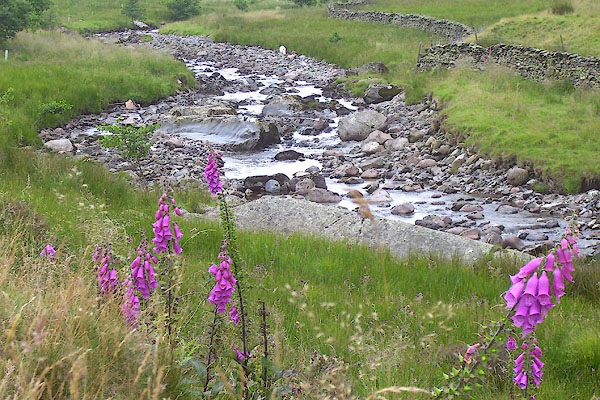 |
 |
   |
|
|
|
|
|
| county:- |
Cumbria |
| also see:- |
 floods, Cumbria floods, Cumbria |
|
|
|
|
|
Draining off the rain.
|
|

BPN80.jpg
|
|
Rivers come in all sizes from tumbling gills hidden in the grass and rocks to magnificent
rivers draining vast areas of the county. All can be peaceful, if not quiet; all can
get up and threaten the land and settlements around them. In Cumbria there is plenty
of rain to feed them.
|
|
|
| evidence:- |
old text:- Gents Mag
|
| source data:- |
Magazine, The Gentleman's Magazine or Monthly Intelligencer or
Historical Chronicle, published by Edward Cave under the
pseudonym Sylvanus Urban, and by other publishers, London,
monthly from 1731 to 1922.
 goto source goto source
Gentleman's Magazine 1819 part 1 p.120 "... I shall conclude ... with Southey's beautiful inscription for a tablet on the
bank of a stream:"
"'Stranger! awhile upon this grassy bank
Recline thee. If the sun ride high, the breeze,
That loves to ripple o'er the rivulet,
Will play around thy brow, and the cool sound
Of running waters sooth thee: Mark how clear
It sparkles o'er the shallows, and behold
Where o'er its surface wheels with restless speed
Yon glossy insect; on the sand below
How swift the shadow flies. The stream is pure
In solitude, and many a healthful herb
Bends o'er its course, and drinks its vital wave;
But passing on amidst the haunts of man
It finds pollution there, and rolls from thence
A tainted tide. Seek'st thou for Happiness!
Go Stranger, sojourn in the woodland cot
Of Innocence, and thou shalt find her there.'"
|
|
|
|
 Water Making Patterns Water Making Patterns |
|
|
|
 Distribution of river names Distribution of river names |
|
|
notes:-
|
|
|
On some maps it seems reasonable at first sight to assume that the abbreviations fl or flu, stand for Latin flumen or fluvius or even flumentum, a stream or river. But it could stand for flud, fludde, flude from Old English, from a teutonic rather than romance root. The English word flood is legitimate synonym for river, not necessarily with the expected connotation of a river in flood but just meaning a body of flowing water, perhaps large. Be careful of jumping to the conclusion that fl and flu abbreviate a Latin not the AngloSaxon word. The early 17th century is a stage in our culture when English was becoming more acceptable for serious works, in preference to Latin.
|
|
The flu for fluvius/flud is used for both rivers and lakes. Some examples:-
|
|
|
|
"Lune flu."
|
|
"Dudden flu:"
|
|
The stop and colon are both used as an abbreviation marker.
|
|
|
|
"Wynster flud"
|
|
"Below flu:"
|
|
"Wynander mere flud"
|
|
"Ulles flu"
|
|
"Eden flude"
|
|
"Elne flu"
|
|
"Ulles flu"
|
|
On this map John Speed uses English for his labelled borders, which is perhaps less
usual. Notice that flu is expanded to flud or flude.
|
|
|
|
"Can flu [Kent]"
|
|
"Ulles flu"
|
|
Nothing is implied about the expansion of the abbreviation.
|
|
|
|
"Cocker Fluv:"
|
|
"Eden Flu:"
|
|
"Lowther Fluvius"
|
|
There is an implication that flu: stands for fluvius.
|
|
|
|
"Dudden flud"
|
|
"flud [labelling Grasmere+Rydal Water]"
|
|
"Lane fl [Lune]"
|
|
.. Notice the implication that fl. is an abbreviation for flud, ie flood? not Latin
flumen.
|
|
|
references:-
|
: (annual): [year] Annual Report on Fisheries in the North West: Environment Agency
(or) &National Rivers Authority
Fryer, Geoffrey: 1991: Natural History of the Lakes, Tarns and Streams of the English
Lake District: Freshwater Biological Association:: ISBN 0 900386 50 9
Hayward, Mike: 1992: Rivers of Cumbria, a Canoeist's Guide: Crdee (Leicester, Leicestershire)::
ISBN 1 871890 36 5
Horne, J E M &Horne, D M: 1984: Lake District Waters, an Index and Bibliography of
Scientific Research: Freshwater Biological Association:: ISSN 0308 6739
Howell, Barry: 1981 (?): Lake District White Water: Cascade Press (Betws-y-Coed, Gwynedd):
vol.1
Watson, John: 1925: English Lake District Fisheries: Foulis, T N (London and Edinburgh)
|
|
|





 floods, Cumbria
floods, Cumbria
 goto source
goto source Water Making Patterns
Water Making Patterns Distribution of river names
Distribution of river names